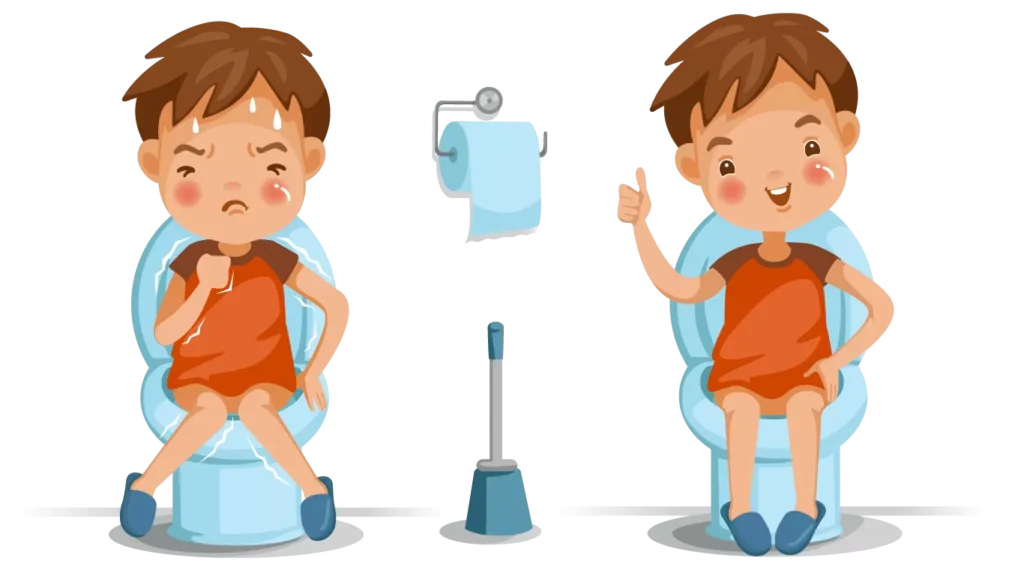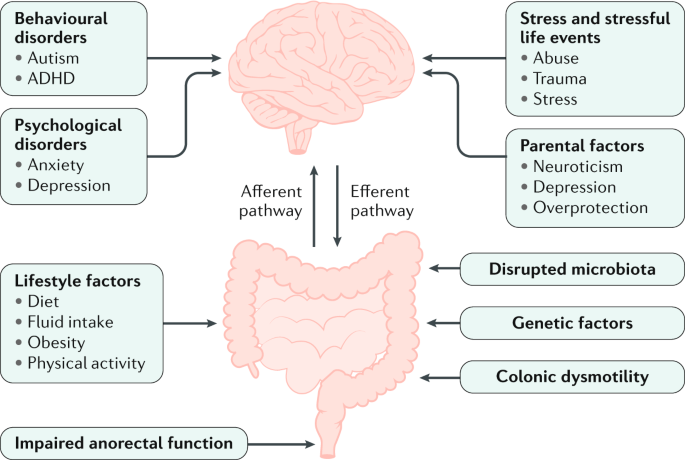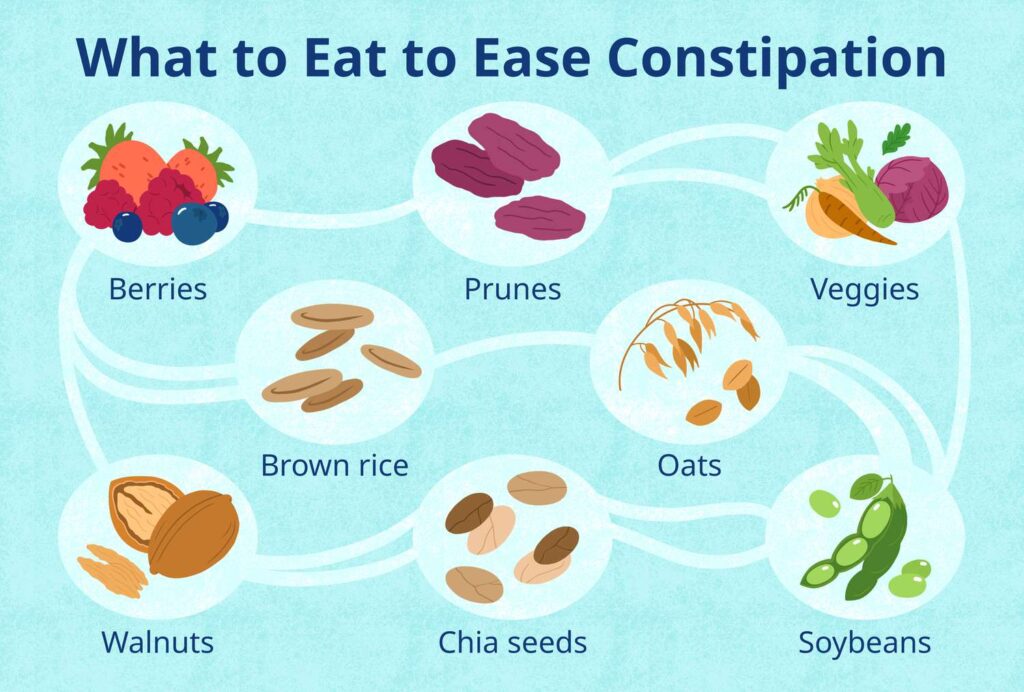Discover the ultimate Constipation Solution: Unlock natural relief methods to alleviate discomfort and promote regularity. Explore effective strategies and remedies for managing constipation naturally.
Table of Contents
Introduction to Constipation
Constipation is a common digestive issue that affects millions of people worldwide. It is characterized by infrequent bowel movements or difficulty passing stool. While occasional constipation is normal, chronic constipation can significantly impact one’s quality of life.
Symptoms of Constipation
- Infrequent Bowel Movements: Having fewer than three bowel movements per week is a common sign of constipation.
- Difficulty Passing Stool: Straining or experiencing pain during bowel movements indicates difficulty passing stool, which is characteristic of constipation.
- Hard or Dry Stool: Stool that is dry, lumpy, or difficult to pass suggests constipation.
- Incomplete Evacuation: Feeling like you haven’t fully emptied your bowels after a bowel movement is another symptom of constipation.
- Abdominal Discomfort: Bloating, cramping, or discomfort in the abdominal region can occur due to constipation.
- Rectal Bleeding: In some cases, constipation can lead to small tears in the rectum, causing bleeding during bowel movements.
- Rectal Blockage: Constipation may cause a blockage in the rectum or anus, making it challenging to pass stool.
- Feeling of Fullness: A sensation of fullness or heaviness in the rectum or abdomen can indicate constipation.
- Reduced Appetite: Some individuals may experience a decrease in appetite or a feeling of being full quickly due to constipation.
- General Discomfort: Overall discomfort or unease in the abdominal area may be present with constipation.
Identifying Constipation Symptoms
- Frequency of Bowel Movements: Monitor the frequency of your bowel movements. If you typically have fewer than three bowel movements per week, it may indicate constipation.
- Consistency of Stool: Pay attention to the consistency of your stool. Hard, dry, and lumpy stools are common characteristics of constipation.
- Difficulty Passing Stool: Straining or experiencing pain during bowel movements is a significant sign of constipation. If you consistently struggle to pass stool, it may indicate underlying constipation.
- Feeling of Incomplete Evacuation: After a bowel movement, if you still feel like you haven’t fully emptied your bowels, it could be a sign of constipation.
- Abdominal Discomfort: Bloating, cramping, or discomfort in the abdominal region are common symptoms of constipation. These sensations may vary in intensity and duration.
- Rectal Bleeding: In some cases, constipation can lead to small tears in the rectum, resulting in rectal bleeding during bowel movements.
- Rectal Blockage: Constipation may cause a blockage in the rectum or anus, making it difficult or painful to pass stool.
- Sensation of Fullness: If you frequently experience a sensation of fullness or heaviness in the rectum or abdomen, it may indicate constipation.
- Reduced Appetite: Constipation can sometimes lead to a decreased appetite or a feeling of being full quickly.
- General Discomfort: Overall discomfort or unease in the abdominal area may accompany constipation, affecting your daily activities and quality of life.

Importance of Natural Solutions
- Gentle on the Body: Natural solutions focus on addressing the underlying cause of constipation without introducing harsh chemicals or synthetic ingredients into the body. They work in harmony with the body’s natural processes, minimizing the risk of adverse side effects or dependency.
- Sustainable Relief: Unlike over-the-counter medications, which may provide temporary relief but fail to address the root cause of constipation, natural remedies offer sustainable relief. By promoting digestive health and regularity, natural solutions help prevent constipation from recurring.
- Holistic Approach: Natural remedies take a holistic approach to health, considering the interconnectedness of the body’s systems. They address not only the symptoms of constipation but also promote overall well-being, supporting optimal digestive function and vitality.
- Long-Term Benefits: Natural solutions offer long-term benefits for digestive health. By incorporating dietary changes, lifestyle modifications, and herbal remedies into your routine, you can improve bowel function and enjoy lasting relief from constipation.
- Minimal Side Effects: Unlike some conventional medications, which may cause unwanted side effects such as bloating, cramping, or diarrhea, natural remedies typically have minimal side effects. They are well-tolerated by most individuals and can be safely used over extended periods.
- Promotion of Digestive Health: Natural remedies focus on promoting digestive health rather than simply masking symptoms. By nourishing the gut microbiome, supporting healthy bowel function, and improving nutrient absorption, natural solutions contribute to overall digestive wellness.
- Reduced Dependency: Over-reliance on laxatives or other medication-based treatments can lead to dependency and diminish the body’s natural ability to regulate bowel movements. Natural solutions empower individuals to take control of their digestive health and reduce dependency on external interventions.
Why Opt for Natural Remedies?
- Minimal Side Effects: Natural remedies typically have fewer side effects compared to pharmaceutical medications. They are gentle on the body and less likely to cause adverse reactions such as bloating, cramping, or diarrhea.
- Holistic Approach: Natural remedies take a holistic approach to health, addressing the root cause of constipation rather than just alleviating symptoms. By promoting overall well-being and supporting the body’s natural processes, natural solutions offer comprehensive benefits for digestive health.
- Sustainable Relief: Unlike over-the-counter laxatives, which may provide temporary relief but fail to address the underlying issue, natural remedies offer sustainable relief from constipation. By promoting regularity and improving bowel function, natural solutions help prevent constipation from recurring.
- Supports Digestive Health: Natural remedies nourish the gut microbiome, support healthy bowel function, and improve nutrient absorption. By promoting digestive health, natural solutions contribute to overall wellness and vitality.
- Reduced Dependency: Over-reliance on pharmaceutical medications can lead to dependency and diminish the body’s natural ability to regulate bowel movements. Natural remedies empower individuals to take control of their health and reduce dependency on external interventions.
- Cost-Effective: Natural remedies are often more affordable than prescription medications or over-the-counter laxatives. They can be easily incorporated into your daily routine without breaking the bank.
- Accessible and Convenient: Many natural remedies for constipation, such as dietary changes, herbal teas, and lifestyle modifications, are readily available and easy to implement. They can be conveniently integrated into your lifestyle without the need for frequent trips to the pharmacy.

Dietary Changes
- Increase Fiber Intake: Fiber plays a crucial role in maintaining bowel regularity by adding bulk to stool and promoting its movement through the digestive tract. Aim to include plenty of fiber-rich foods in your diet, such as fruits, vegetables, whole grains, legumes, and nuts.
- Choose Whole Grains: Opt for whole grains instead of refined grains to boost your fiber intake. Choose whole wheat bread, brown rice, oats, quinoa, and barley as nutritious alternatives to white bread, white rice, and other refined grains.
- Eat Plenty of Fruits and Vegetables: Fruits and vegetables are excellent sources of fiber, vitamins, minerals, and antioxidants that support digestive health. Include a variety of colorful fruits and vegetables in your meals and snacks to ensure a diverse nutrient intake.
- Prunes and Prune Juice: Prunes and prune juice are natural laxatives that can help relieve constipation. They contain sorbitol, a sugar alcohol that draws water into the intestines, softening stool and promoting bowel movements.
- Stay Hydrated: Drinking an adequate amount of water is essential for maintaining proper hydration and supporting healthy digestion. Aim to drink at least eight glasses of water per day, and increase your fluid intake if you’re consuming high-fiber foods or engaging in physical activity.
- Limit Processed Foods: Processed foods that are high in fat, sugar, and refined carbohydrates can contribute to constipation. Limit your intake of processed snacks, sweets, fried foods, and sugary beverages, and focus on whole, minimally processed foods instead.
- Include Healthy Fats: Incorporate sources of healthy fats, such as avocados, nuts, seeds, and olive oil, into your diet. Healthy fats help lubricate the digestive tract and promote smooth bowel movements.
- Probiotic-Rich Foods: Probiotics are beneficial bacteria that support gut health and promote regular bowel movements. Include probiotic-rich foods in your diet, such as yogurt, kefir, sauerkraut, kimchi, and other fermented foods.
- Limit Caffeine and Alcohol: Caffeine and alcohol can have a dehydrating effect on the body, which can contribute to constipation. Limit your intake of caffeinated beverages like coffee, tea, and soda, as well as alcoholic beverages, and opt for water or herbal teas instead.
- Gradual Changes: When increasing your fiber intake, do so gradually to allow your digestive system to adjust. Rapidly increasing fiber intake can cause bloating, gas, and discomfort, so gradually incorporate fiber-rich foods into your diet over time.
Fiber-Rich Foods for Regularity
- Whole Grains: Whole grains are excellent sources of dietary fiber. Opt for whole grain bread, brown rice, quinoa, oats, barley, and whole wheat pasta to increase your fiber intake.
- Fruits: Many fruits are high in fiber and can help promote bowel regularity. Some fiber-rich fruits include apples, pears, berries, oranges, bananas, and prunes. Be sure to eat the skin of fruits whenever possible, as it contains additional fiber.
- Vegetables: Vegetables are rich in fiber, vitamins, minerals, and antioxidants. Include a variety of vegetables in your diet, such as leafy greens, broccoli, carrots, Brussels sprouts, sweet potatoes, and peas.
- Legumes: Legumes, such as beans, lentils, chickpeas, and peas, are excellent sources of both soluble and insoluble fiber. Add them to soups, salads, stews, and casseroles to boost your fiber intake.
- Nuts and Seeds: Nuts and seeds are nutritious snacks that provide fiber, healthy fats, protein, and various vitamins and minerals. Almonds, walnuts, chia seeds, flaxseeds, and pumpkin seeds are all excellent choices for increasing fiber consumption.
- Oatmeal: Oatmeal is a hearty breakfast option that is high in soluble fiber, which helps soften stool and promote bowel movements. Choose steel-cut oats or rolled oats and add toppings like fruit, nuts, and seeds for extra fiber and flavor.
- Popcorn: Air-popped popcorn is a satisfying snack that is low in calories and high in fiber. Enjoy it as a healthy alternative to traditional snack foods like chips or pretzels.
- Whole Grain Cereals: Look for breakfast cereals that are high in fiber and low in added sugars. Choose cereals made from whole grains, bran, or oats, and top them with fruit and nuts for added fiber and nutrition.
- Avocados: Avocados are not only delicious but also packed with fiber, healthy fats, and vitamins. Add sliced avocado to salads, sandwiches, wraps, or smoothies to increase your fiber intake.
- Berries: Berries such as raspberries, blackberries, strawberries, and blueberries are not only tasty but also rich in fiber and antioxidants. Enjoy them on their own as a snack, or add them to yogurt, oatmeal, or smoothies for a nutritious boost.

Lifestyle Modifications
- Regular Exercise: Engaging in regular physical activity can help stimulate bowel movements and promote regularity. Aim for at least 30 minutes of moderate exercise most days of the week, such as brisk walking, jogging, cycling, swimming, or yoga.
- Stay Hydrated: Drinking plenty of water is essential for maintaining proper hydration and supporting healthy digestion. Aim to drink at least eight glasses of water per day, and increase your fluid intake if you’re consuming high-fiber foods or engaging in physical activity.
- Establish a Routine: Try to establish a regular schedule for eating meals and going to the bathroom. Eating meals at the same time each day and dedicating time for bathroom breaks can help train your body to maintain regular bowel movements.
- Avoid Holding It In: Resist the urge to delay or ignore the urge to have a bowel movement. Holding in stool can lead to constipation and make it more difficult to pass stool when you do finally go.
- Reduce Stress: Chronic stress can have a negative impact on digestive health and contribute to constipation. Practice stress-reduction techniques such as deep breathing exercises, meditation, yoga, or tai chi to promote relaxation and support digestive function.
- Prioritize Sleep: Getting an adequate amount of sleep is essential for overall health, including digestive health. Aim for seven to nine hours of quality sleep per night to support optimal bodily functions, including digestion and bowel movements.
- Don’t Rush: Take your time when using the bathroom and allow yourself enough time to fully evacuate your bowels. Rushing through bowel movements can lead to incomplete evacuation and contribute to constipation.
- Increase Physical Activity: In addition to structured exercise, incorporating more movement into your daily routine can help promote bowel regularity. Take short walks after meals, use the stairs instead of the elevator, or try standing or stretching breaks throughout the day.
- Practice Good Toilet Habits: Use proper posture when sitting on the toilet by keeping your feet flat on the floor and leaning slightly forward. Use a stool or footrest to elevate your feet if needed to mimic a squatting position, which can help facilitate easier bowel movements.
- Limit Caffeine and Alcohol: Caffeine and alcohol can have a dehydrating effect on the body, which can contribute to constipation. Limit your intake of caffeinated beverages like coffee, tea, and soda, as well as alcoholic beverages, and opt for water or herbal teas instead.
Regular Exercise and Bowel Movements
- Stimulates Intestinal Muscles: Exercise helps stimulate the muscles in the intestines, promoting more frequent and regular bowel movements. Physical activity increases the contractions of the intestinal muscles, which helps move stool through the digestive tract more efficiently.
- Speeds Up Digestion: Engaging in aerobic exercise, such as brisk walking, jogging, cycling, or swimming, can help speed up digestion by increasing blood flow to the digestive organs. This accelerated digestion process can lead to more frequent bowel movements.
- Reduces Constipation Risk: Regular exercise can help reduce the risk of constipation by promoting regularity and preventing stool from becoming stagnant in the intestines. Physical activity helps keep the digestive system functioning optimally, reducing the likelihood of constipation.
- Promotes Gut Motility: Exercise stimulates gut motility, which refers to the movement of food and waste through the digestive tract. By increasing gut motility, exercise helps prevent constipation and supports healthy bowel function.
- Alleviates Stress: Stress can contribute to digestive issues, including constipation. Exercise is known to reduce stress levels by promoting the release of endorphins, which are natural mood elevators. By reducing stress, exercise indirectly supports digestive health and regular bowel movements.
- Encourages Hydration: Physical activity encourages hydration by increasing sweat production and prompting individuals to drink more water to replenish fluids lost during exercise. Proper hydration is essential for maintaining soft, bulky stool and preventing constipation.
- Improves Overall Health: Regular exercise offers numerous health benefits beyond promoting bowel movements, including weight management, cardiovascular health, and improved mood. By prioritizing exercise as part of a healthy lifestyle, individuals can support overall well-being, including digestive health.
Herbal Remedies
- Senna: Senna is a natural laxative derived from the leaves of the Senna alexandrina plant. It contains compounds called anthraquinones, which stimulate bowel movements by increasing intestinal muscle contractions. Senna is available in various forms, including tea, capsules, and tablets.
- Ginger: Ginger is well-known for its digestive properties and can help alleviate constipation. It stimulates digestion, reduces inflammation in the gastrointestinal tract, and promotes bowel movements. Enjoy ginger tea, add fresh ginger to your meals, or take ginger supplements to support digestive health.
- Dandelion Root: Dandelion root has mild laxative properties and can help stimulate bowel movements. It also acts as a diuretic, promoting the excretion of excess fluids from the body, which can help relieve bloating and discomfort associated with constipation. Dandelion root tea is a popular herbal remedy for constipation relief.
- Aloe Vera: Aloe vera contains compounds called anthraquinones, which have laxative effects and can help relieve constipation. Aloe vera juice or gel can be consumed orally to stimulate bowel movements and support digestive health. However, it’s essential to use aloe vera products specifically intended for internal use and follow dosage recommendations carefully.
- Peppermint: Peppermint has antispasmodic properties that can help relax the muscles of the digestive tract and alleviate constipation. Peppermint tea is a soothing herbal remedy that can help relieve abdominal discomfort and promote bowel movements.
- Fennel: Fennel seeds are rich in fiber and essential oils that can help support digestion and relieve constipation. Chewing on fennel seeds or drinking fennel tea after meals can help stimulate digestive function and promote regular bowel movements.
- Psyllium Husk: Psyllium husk is a soluble fiber derived from the seeds of the Plantago ovata plant. It absorbs water in the digestive tract, forming a gel-like substance that softens stool and promotes bowel movements. Psyllium husk supplements are available in powder or capsule form and can be taken with plenty of water to relieve constipation.
- Licorice Root: Licorice root has mild laxative properties and can help promote bowel movements. It also supports digestive health by soothing inflammation in the gastrointestinal tract and relieving abdominal discomfort. Licorice root tea or supplements can be used to alleviate constipation.
- Triphala: Triphala is an Ayurvedic herbal formula consisting of three fruits: amalaki, bibhitaki, and haritaki. It is traditionally used to support digestive health and alleviate constipation. Triphala promotes bowel movements, cleanses the colon, and balances digestive function.
- Marshmallow Root: Marshmallow root contains mucilage, a gel-like substance that coats the lining of the digestive tract and soothes inflammation. It can help relieve constipation and promote bowel movements by softening stool and easing passage through the intestines. Marshmallow root tea or supplements can be used to support digestive health.

Supplements for Constipation Relief
- Probiotics: Probiotics are beneficial bacteria that support gut health and digestive function. They help maintain a healthy balance of bacteria in the intestines, which can promote regular bowel movements. Probiotic supplements containing strains such as Lactobacillus and Bifidobacterium can help alleviate constipation and improve overall digestive health.
- Magnesium: Magnesium is a mineral that plays a crucial role in muscle function, including the muscles of the digestive tract. Magnesium supplements can help relax the muscles of the intestines, making it easier to pass stool. Magnesium citrate is a commonly used form of magnesium for constipation relief, as it also has a mild laxative effect.
- Fiber Supplements: Fiber supplements can help increase your daily fiber intake, promoting bowel regularity and alleviating constipation. Psyllium husk, methylcellulose, and wheat dextrin are common types of fiber supplements that can be taken in powder or capsule form. These supplements work by adding bulk to stool and facilitating its passage through the digestive tract.
- Osmotic Laxatives: Osmotic laxatives work by drawing water into the intestines, softening stool and promoting bowel movements. Examples of osmotic laxatives include polyethylene glycol (PEG), lactulose, and sorbitol. These supplements can be effective for relieving occasional constipation but should be used with caution and under the guidance of a healthcare professional.
- Digestive Enzymes: Digestive enzymes supplements contain enzymes such as amylase, protease, and lipase, which help break down food and facilitate nutrient absorption. They can also aid in digestion and relieve symptoms of bloating and discomfort associated with constipation. Digestive enzyme supplements are available in capsule or tablet form and can be taken with meals to support digestive health.
- Prebiotics: Prebiotics are non-digestible fibers that serve as food for beneficial bacteria in the gut. By promoting the growth of beneficial bacteria, prebiotics can help support digestive health and alleviate constipation. Supplements containing prebiotic fibers such as inulin, chicory root, and acacia fiber can be taken to support gut flora balance and improve bowel regularity.
- Herbal Supplements: Certain herbal supplements, such as cascara sagrada, aloe vera, and rhubarb root, have natural laxative properties and can help stimulate bowel movements. These supplements should be used with caution and under the guidance of a healthcare professional, as they may have strong effects on the digestive system.
Strategies for Maintaining Regular Bowel Movements
- Eat a High-Fiber Diet: Include plenty of fiber-rich foods in your diet, such as fruits, vegetables, whole grains, legumes, nuts, and seeds. Fiber adds bulk to stool and helps promote regular bowel movements. Aim to consume at least 25-30 grams of fiber per day for optimal digestive health.
- Stay Hydrated: Drink plenty of water throughout the day to stay hydrated. Adequate hydration softens stool and makes it easier to pass through the digestive tract. Aim to drink at least eight glasses of water per day, and increase your fluid intake if you’re consuming a high-fiber diet or engaging in physical activity.
- Establish a Routine: Try to establish a regular schedule for eating meals and going to the bathroom. Eating meals at the same time each day and dedicating time for bathroom breaks can help train your body to maintain regular bowel movements.
- Exercise Regularly: Engage in regular physical activity to stimulate bowel movements and promote bowel regularity. Exercise helps stimulate the muscles of the intestines and speeds up digestion, making it easier to pass stool. Aim for at least 30 minutes of moderate aerobic activity most days of the week.
- Don’t Ignore the Urge: Pay attention to your body’s signals and respond promptly when you feel the urge to have a bowel movement. Ignoring the urge to go can lead to constipation and make it more difficult to pass stool when you do finally go.
- Practice Proper Toilet Habits: Use proper posture when sitting on the toilet by keeping your feet flat on the floor and leaning slightly forward. Use a stool or footrest to elevate your feet if needed to mimic a squatting position, which can help facilitate easier bowel movements.
- Manage Stress: Chronic stress can negatively impact digestive health and contribute to constipation. Practice stress-reduction techniques such as deep breathing exercises, meditation, yoga, or tai chi to promote relaxation and support digestive function.
- Limit Caffeine and Alcohol: Caffeine and alcohol can have a dehydrating effect on the body, which can contribute to constipation. Limit your intake of caffeinated beverages like coffee, tea, and soda, as well as alcoholic beverages, and opt for water or herbal teas instead.
- Consider Probiotics: Probiotics are beneficial bacteria that support gut health and can help regulate bowel movements. Consider taking a probiotic supplement or consuming probiotic-rich foods such as yogurt, kefir, sauerkraut, kimchi, and kombucha to support digestive health.
- Consult a Healthcare Professional: If you’re experiencing persistent constipation or changes in bowel habits, consult a healthcare professional for proper evaluation and treatment. They can help identify underlying causes of constipation and recommend appropriate interventions to help you achieve and maintain regular bowel movements.
Conclusion
Constipation is a common digestive issue that can significantly impact one’s quality of life. While over-the-counter medications offer temporary relief, natural solutions provide a sustainable and holistic approach to managing constipation. By making dietary changes, incorporating lifestyle modifications, and exploring herbal remedies and supplements, individuals can unlock relief naturally and enjoy better digestive health.
FAQs (Frequently Asked Questions)
1. Are natural remedies safe for treating constipation?
Yes, natural remedies are generally safe and well-tolerated. However, it’s essential to consult with a healthcare professional before trying any new treatment, especially if you have underlying health conditions or are taking medications.
2. How long does it take for natural remedies to relieve constipation?
The timeline for experiencing relief may vary depending on individual factors such as diet, lifestyle, and the severity of constipation. In general, consistent use of natural remedies can lead to improvement within a few days to a week.
3. Can constipation be a sign of a more serious underlying condition?
In some cases, chronic constipation may be a symptom of an underlying medical condition such as irritable bowel syndrome (IBS), thyroid disorders, or colorectal cancer. It’s essential to seek medical evaluation if constipation persists or is accompanied by other concerning symptoms.
4. Are there any dietary restrictions for managing constipation?
While increasing fiber intake is beneficial for relieving constipation, it’s essential to do so gradually to prevent bloating and discomfort. Additionally, staying hydrated and limiting intake of processed foods and refined sugars can support digestive health.
5. What lifestyle changes can help prevent constipation?
Incorporating regular exercise, managing stress effectively, and establishing a consistent bowel routine are key lifestyle changes for preventing constipation. Prioritizing self-care and maintaining a healthy lifestyle can contribute to overall digestive wellness.



MOST COMMENTED
Animal-Based Proteins / Casein Protein / Dietary Protein / High-Protein Diets / Pea Protein / Plant-Based Proteins / Protein / Protein Deficiency / Protein Supplements / Proteins / Whey Protein / Whey Proteins
Is Protein Powder Safe for Teenagers and Children?
Animal-Based Proteins / Casein Protein / Dietary Protein / High-Protein Diets / Pea Protein / Plant-Based Proteins / Protein / Protein Deficiency / Protein Supplements / Proteins / Whey Protein / Whey Proteins
Unlock the Power of Proteins for Optimal Gut Health
Animal-Based Proteins / Casein Protein / Dietary Protein / High-Protein Diets / Pea Protein / Plant-Based Proteins / Protein / Protein Deficiency / Protein Supplements / Proteins / Whey Protein / Whey Proteins
Pea Proteins: The Best Plant-Based Protein Alternative?
Multivitamin
Total Health: Multivitamin for Active Lifestyles
Multivitamin
WellnessFusion: Complete Multivitamin Support
Dietary Supplement
Revitalize Your Health: The Magic of Red Yeast Rice Capsules
Foot care / Foot Health
Revitalize Your Foot Care Routine: Essential Tips for Optimal Foot Health
Foot Problem / Diabetics / Foot Health
Diabetics: Mastering Footwear Selection for Enhanced Foot Health and Ultimate Comfort
Exercises and Footwear Tips for Hammertoe Relief / Foot care / Foot Health / Foot Pain / Foot Problem / Hammertoes
Unlock Effective Exercises and Footwear Tips for Hammertoe Relief
Hammertoes / Foot Health / Foot Pain / Foot Problem
Unlock Relief: Essential Guide to Hammertoes Causes, Symptoms, and Treatments